It is impossible to ignore the warning signs of a recession or hear talk of a great recession in 2023. Everywhere you turn you see headlines of banking industry failures, inflation, and general gloom and doom regarding the present economy. Many business owners are looking to diversify within their industry or find ways to bolster sales and protect the bottom line. Real estate investors are no different. How can I invest in an asset class that is recession ready? While there is no completely foolproof way to protect an investment, there are certainly ways to mitigate risk. If a recession hits, some industries will suffer relatively low losses and camping is historically one of the few industries that remains strong despite economic woes.
Why are RV parks recession resistant?
-Camping is on average up to 67% cheaper than other vacation options and camping has historically seen sustained reservation rates despite economic distress.
-RV parks are sheltered from higher insurance premiums which protects profit margin.
-Loan-to-value ratios on RV parks are typically 75% or less.
-RV parks can be a solution for workforce housing and meet housing demands.
When the economy tanks, we all find ways to cut expenses and have to get creative. Instead of international travel to an exotic locale, we look to stick closer to home and find new places to explore without the expense of hotels, resorts, or flights. Staying in a RV park or a RV resort is one way to offset expenses without having to sacrifice amenities like glamping cabins, water parks, pools, or old fashioned fireside chats. In 2009, a study sponsored by the Recreation Vehicle Industry Association found that the average camping vacation is 21%-67% cheaper than a traditional drive/fly/hotel vacation. Nightly rates to stay at even the highest-end RV resorts are exponentially cheaper than even some of the more basic hotel chains. Nightly rates at most campgrounds and RV parks start anywhere from $30-$150. RV parks offer adaptable and flexible vacation options that cater to all types of lifestyles. Historical data has repeatedly shown that during times of recession, people look to nature and the great outdoors as a way to cope. Camping bookings increased in prior years of recession, specifically during the 1980, 1990, and 2008 downturns. Historicity shows significant booms in RV shipments in the months immediately following a recession. If an economic downturn is inevitable, the lower cost of RV travel coupled with historical trends shows that the RV industry remains recession resistant.
The RV and camping community is growing exponentially. According to the 2023 camping report conducted by thedyrt camping app, the United States has seen approximately 15.5 million first-time campers over the last two years, and a total of about 80 million campers in the US with the most common camping type being an RV. With the influx of newer and first-time RV’ers, many campground owners have experienced higher reservation ratios and campers have indicated that the availability of campsites is much less than in years prior. Campers reported that finding an open campsite was their biggest challenge to date. Increased demand has property managers and operators responding by adding additional campsites. In 2022 over 35% of property owners added campsites and 48.6% of them raised rates based on thedyrt.com respondents. Just last year Climb Capital added 50 sites to two existing parks.
Commercial real estate property owners have experienced a tremendous hike in insurance premiums over the last year. In 2023, insurance rates are expected to go up by as much as 40%-50% according to the Yardi Matrix report. With higher insurance premiums at stake, underwriting becomes much more conservative and margins thin. While these margins affect all commercial real estate, RV parks are a niche within this market. The bulk of the premium when it comes to RV park insurance is tied up in liability insurance. Fewer structures and buildings to insure drive down the cost of property insurance. Liability insurance protects against the losses of legal claims and is historically less costly than insurance policies for apartment complexes, townhomes, or other types of multi-family real estate. Climb Capital’s CEO, Robert Preston, has experience in owning both RV parks as well as apartment complexes and stated that on average, RV parks premiums are roughly 75% less as compared to comparable apartment complexes with the same revenue. The enticing aspect of RV parks though is that they generate the same amount of revenue but with much less insurance expense. Saving thousands each year in insurance premiums is one-way Climb is able to realize increased profits specifically within the RV park industry.
RV parks are in a different category when it comes to lending. Financial institutions who specialize in RV park debt typically offer loan to value (LTV) of 75% or less. Less debt service reduces risk. Workforce housing continues to be in high demand, and in a post-COVID world where remote work is now more feasible than ever, would be homeowners are turning to RV’s as a housing solution. As housing shortages are seen nationwide, many are staying in campgrounds that offer monthly stays until more permanent housing is built or becomes available. Many of the parks Climb Capital is buying are located where economic expansion is underway and housing is at a premium. RV parks offer a unique opportunity for residents needing immediate housing.
There is no guarantee of a recession in the years to come. However, smart investing means weighing the options and pursuing markets that are able to withstand economic adversity. Climb Capital continues to stay ahead of the market by purchasing cash-flowing assets within a class that historically remains strong, particularly in economic downturns.



